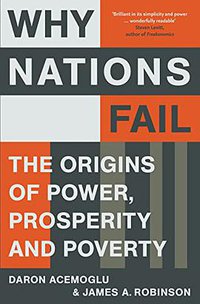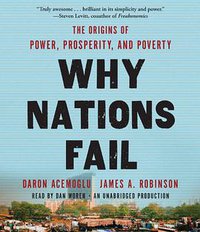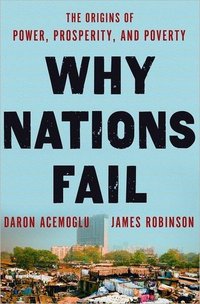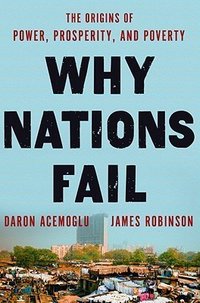Why Nations Fail
谷歌图书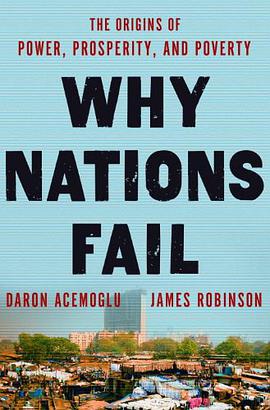
The Origins of Power, Prosperity, and Poverty
Why Nations Fail: The Origins of Power, Prosperity, and Poverty
Daron Acemoglu / James Robinson
简介
NEW YORK TIMES AND WALL STREET JOURNAL BESTSELLER • From two winners of the 2024 Nobel Prize in Economic Sciences, “who have demonstrated the importance of societal institutions for a country’s prosperity”
“A wildly ambitious work that hopscotches through history and around the world to answer the very big question of why some countries get rich and others don’t.”—The New York Times
FINALIST: Financial Times and Goldman Sachs Business Book of the Year Award • ONE OF THE BEST BOOKS OF THE YEAR: The Washington Post, Financial Times, The Economist, BusinessWeek, Bloomberg, The Christian Science Monitor, The Plain Dealer
Why are some nations rich and others poor, divided by wealth and poverty, health and sickness, food and famine? Is it culture, the weather, or geography that determines prosperity or poverty? As Why Nations Failshows, none of these factors is either definitive or destiny.
Drawing on fifteen years of original research, Daron Acemoglu and James Robinson conclusively show that it is our man-made political and economic institutions that underlie economic success (or the lack of it). Korea, to take just one example, is a remarkably homogenous nation, yet the people of North Korea are among the poorest on earth while their brothers and sisters in South Korea are among the richest. The differences between the Koreas is due to the politics that created those two different institutional trajectories. Acemoglu and Robinson marshal extraordinary historical evidence from the Roman Empire, the Mayan city-states, the Soviet Union, the United States, and Africa to build a new theory of political economy with great relevance for the big questions of today, among them:
• Will China’s economy continue to grow at such a high speed and ultimately overwhelm the West?
• Are America’s best days behind it? Are we creating a vicious cycle that enriches and empowers a small minority?
“This book will change the way people think about the wealth and poverty of nations . . . as ambitious as Jared Diamond’s Guns, Germs, and Steel.”—BusinessWeek
contents
Contents
Preface
Why Egyptians filled Tahrir Square to bring down Hosni Mubarak and what it means for our understanding of the causes of prosperity and poverty
1. So Close and Yet So Different
Nogales, Arizona, and Nogales, Sonora, have the same people, culture, and geography. Why is one rich and one poor?
2. Theories That Don't Work
Poor countries are poor not because of their geographies or cultures, or because their leaders do not know which policies will enrich their citizens
3. The Making of Prosperity and Poverty
How prosperity and poverty are determined by the incentives created by institutions, and how politics determines what institutions a nation has
4. Small Differences and Critical Junctures: The Weight of History
How institutions change through political conflict and how the past shapes the present
5. "I've Seen the Future, and It Works": Growth Under Extractive Institutions
What Stalin, King Shyaam, the Neolithic Revolution, and the Maya city-states all had in common and how this explains why China?s current economic growth cannot last
6. Drifting Apart
How institutions evolve over time, often slowly drifting apart
7. The Turning Point
How a political revolution in 1688 changed institutions in England and led to the Industrial Revolution
8. Not on Our Turf: Barriers to Development
Why the politically powerful in many nations opposed the Industrial Revolution
9. Reversing Development
How European colonialism impoverished large parts of the world
10. The Diffusion of Prosperity
How some parts of the world took different paths to prosperity from that of Britain
11. The Virtuous Circle
How institutions that encourage prosperity create positive feedback loops that prevent the efforts by elites to undermine them
12. The Vicious Circle
How institutions that create poverty generate negative feedback loops and endure
13. Why Nations Fail Today
Institutions, institutions, institutions
14. Breaking the Mold
How a few countries changed their economic trajectory by changing their institutions
15. Understanding Prosperity and Poverty
How the world could have been different and how understanding this can explain why most attempts to combat poverty have failed
Acknowledgments
Bibliographical Essay and Sources
References
Index


